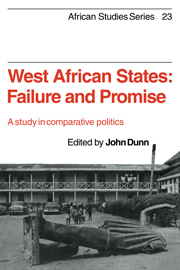3 - Guinea
Published online by Cambridge University Press: 19 January 2010
Summary
A study of the political development of the Republic of Guinea since its independence in September 1958 is of special interest and importance to any comparative attempt to understand the evolution of postindependence politics in Africa in general. For Guinea is still ruled by a radical single party regime: the PDG (Parti Démocratique de Guinée), led by Sekou Touré, won power in May 1957 and in 1977 it – and he – are still in control. The fate of such regimes elsewhere in Africa suggests strongly that it is a vanishing species and there is no doubt that the isolation to which the Touré regime has, so to speak, condemned itself by virtue of its sheer durability is itself a major factor affecting Guinean development. In the early 1960s Touré was self-consciously a member of a radical cohort, flanked by Nkrumah of Ghana, Massemba-Débat of the Congo (Brazzaville), Modibo Keita of Mali, Nyerere of Tanzania, Ben Bella of Algeria, Lumumba of the Congo (Zaire), and Nasser of the U. A.R. These compagnons de route fell in a steady succession: Lumumba almost immediately, Ben Bella in 1965, Nkrumah in 1966, Massemba- Debat and Modibo Keita in 1968. Nasser, mortally stricken by the Six Day War of 1967, from which he never recovered either personally or politically, died in 1970 and it is already clear that his regime has not survived him.
For the Touré regime the demise of these radical analogues has provided a series of bitter and successive shocks.
- Type
- Chapter
- Information
- West African States: Failure and PromiseA Study in Comparative Politics, pp. 36 - 65Publisher: Cambridge University PressPrint publication year: 1978
- 3
- Cited by

